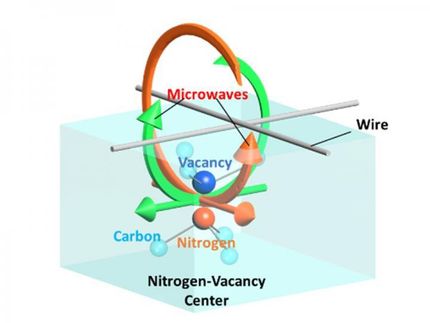Switching Qubits with a Terahertz Source?
Rotational transitions induced in molecules on a chip could have important applications in quantum computing
Advertisement
Scientists in Germany and the USA have been able to induce rotational transitions in molecules trapped at a close distance above a chip using a terahertz source. The new results, which are published in ChemPhysChem, could have interesting applications in quantum computing.
Polar molecules in selected quantum states can be guided, decelerated and trapped using electric fields created by microstructured electrodes on a chip. One of the possible applications of such molecules on a chip is their use in future quantum computers. However, to achieve this, researchers must be able to drive transitions from a certain quantum state to another one, that is, they should to be able "to switch a qubit (or quantum bit)". A transition between two rotational levels in a molecule is very well suited for this, and that is the reason why Gabriele Santambrogio and co-workers at the Fritz Haber Institute of the Max Planck Society in Berlin and Liam Duffy of the University of North Carolina at Greensboro decided to use a rather uncommon narrowband terahertz (THz) source to induce rotational transitions in laser-prepared metastable CO molecules. The researchers coupled the source to a chip setup that had been previously developed by them and studied the transitions between two quantum states in polar molecules trapped on the chip.
According to co-author Gerard Meijer, both the experimental approach and the results of this work are unique. The combination of laser-prepared molecules in a single rotational level, tunable narrow-band mm-wave radiation that can transfer the population to another rotational level, and state-selective detection of the molecules at a known delay and position, offers many interesting possibilities. With this approach, the research team has not only been able to trap the polar molecules on a chip but has also played further games with them—like inducing the rotational transitions. Meijer believes that these results could find important applications in quantum computing: "In the future, it is conceivable that compact THz sources are integrated on a chip, and that one can use this to switch between qubits in a routine fashion", he says.































































